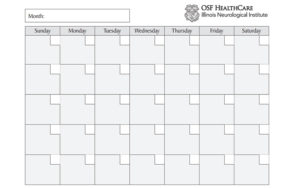For people with chronic or severe headaches, just ignoring the problem and hoping it goes away is not an option. Some people suffer from headaches so severe the pain is nearly unbearable. Others suffer headaches so often their ability to lead normal functioning lives is impaired.
If you suffer headaches that need treatment with acute medication like aspirin or ibuprofen less than five days per month, you probably don’t need to worry, says Hrachya Nersesyan, MD, a neurologist and the director of the OSF HealthCare Illinois Neurological Institute Headache and Craniofacial Pain Program. If you need pain relievers more often than that, or you suffer from headaches of any severity on more than 3-4 days per week, you should discuss proper treatment with your doctor or a headache specialist, because you may have a headache disorder needing attention and targeted management.
“Some primary headache disorders like migraines are not curable, but very treatable” Dr. Nersesyan says. “The goal of treatment is to decrease the frequency of the headaches, have effective acute treatment strategies in place when a headache comes, and to restore normal functionality so headaches stop interfering with everyday life”
Seeing a specialist is a great step in managing a headache disorder, but your provider will need you to do some work to help fight your headache disorder, and that work begins with a headache calendar.
What is a headache calendar?
A headache calendar is a sort of headache journal. All you need is a plain old calendar, a shorthand system and an understanding of what to look for. If filled out properly, the headache calendar will help you and your health care provider monitor your medication use and figure out what triggers your headaches and what aggravates them.
We’ve designed one you can print out to get you started, if you’d like.
How to keep an effective headache calendar

Use our helpful headache calendar to track your triggers and symptoms.
Download
They key to keeping a truly helpful headache calendar is to keep it simple. Figure out a shorthand that is easy to remember, so you can communicate the maximum amount of information in the smallest amount of space.
Here are some tips for maintaining a useful headache calendar:
1. Mark every day you have a headache with an “H” for regular headache, “M” for migraine, or “C” for cluster.
2. Rate the pain at its worst that day using the following pain scale:
- 1-2: Headache is in the background. You can still function and carry out daily activities.
- 3-5: Headache may be distracting, but can be ignored if you are busy.
- 6-7: Headache is starting to interfere with daily activities. Pain may make it difficult to concentrate.
- 8-10: Cannot engage in daily activities. You want to lay down and be left alone.
3. Write down whatever headache medication you took that day, how much you took, when you took it and if it helped.
This information may be helpful at your next office visit.
4. Write down any possible headache triggers or aggravators to which you’ve been exposed.
Possible headache triggers may include:
Diet
- Alcohol
- Aspartame
- Caffeinated beverages
- Nitrites/nitrates from processed meats
- Not drinking enough water
Stress
- Crisis
- Moving
- Relationship difficulties
- Loss or change
Hormones
- Menstrual period
- Ovulation
Sensory stimuli
- Strong or flickering lights
- Odors
- Loud sounds
Changes in environment or habits
- Weather
- Travel
- Change of season
- Schedule change
- Sleeping patterns
- Skipping meals
5. As there is frequently an association between migraines and hormonal fluctuations, if you are a female make sure to also mark the days of your cycle on the calendar.
Learn more about the options available to you for headache treatment, or make an appointment, at ini.org.
Last Updated: January 21, 2025
